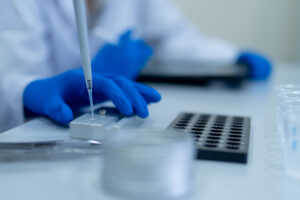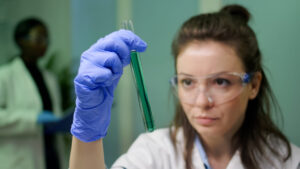There are currently over 7,000 identified rare genetic disorders. In theory, each of these can be detected by genetic screening, however knowing which rare disease you are looking for, can greatly enhance the accuracy of genetic testing.
Genetic disorders
The most common prevalence
The following rare syndromes occur in approximately, 1 in every 2,000 live births in the US. This makes them rare diseases, in terms of how many individuals a year are diagnosed with them, but in the field of rare diseases, it makes them more common than many others.
Down syndrome is the exception, occurring in 1 in every 700 live births in the US. It is the most well-known of genetic syndromes, in part due to its prevalence, but also due to increased awareness of its causes, and the introduction of standardized screening for Down syndrome as part of antenatal care for expecting mothers in the developed world.
Down syndrome
Down syndrome is caused by the addition of a partial or complete copy of chromosome 21 in an individual. Hence its other name, Trisomy 21. Research has, as yet, still not been able to fully understand the exact reasons for why the extra chromosome develops. Maternal age has been identified as being a risk factor for Down syndrome, and the older a Mother is at conception, the higher the risk.
There are many genetic screening options when it comes to genetic Down syndrome testing during pregnancy specifically.
Sequential Integrated Screening: this is usually offered to all pregnant women in the US, as a part of their regular pregnancy care, during the first trimester. The testing is non-invasive and involves taking a blood sample from the mother, and a measurement of the fluid at the back of the developing baby’s neck by ultrasound. These are combined with the age of the Mother to identify a risk for Down syndrome in the fetus. This testing can be repeated at the start of the second trimester, with a second blood sample taken from the Mother, which is then combined with the results from the first round of screening. This is considered to be more accurate.
Non-invasive prenatal testing: while not yet a standard part of pregnancy care, these new non-invasive testing options are increasingly popular amongst both doctors and pregnant women. They involve screening the DNA found in a Mother’s bloodstream, as during pregnancy her blood contains not only her DNA, but cells from the placenta also. These cells from the placenta usually mirror exactly the genetic makeup of the developing child. This form of testing is most accurate when it comes to identifying chromosomal conditions, such as a missing chromosome 21, and subsequent Down syndrome.
Amniocentesis: this invasive genetic diagnosis for rare disease method is usually recommended if earlier screenings indicate a higher risk for Down syndrome. Performed early in the second trimester of pregnancy, it involves the insertion of a needle through the Mother’s abdomen to retrieve a small amount of the amniotic fluid that surrounds the baby. This sample is then analyzed, via karyotype analysis. Amniocentesis is considered to be very accurate at identifying Down syndrome, although it does carry a very small risk of miscarriage.
Chorionic Villus Sampling (CVS): this is a procedure similar to amniocentesis, although it takes place in the first trimester of pregnancy. Again, a needle is inserted through the abdomen (sometimes it is done with a catheter inserted through the cervix) to take a sample of tissue from the placenta. This sample then undergoes karyotype analysis to detect chromosomal changes.
Ultrasound: ultrasounds performed to identify any serious health issues with a developing baby, can also sometimes reveal the physical signs of Down syndrome. This might include congenital heart defects, a nose that measures wider than average, and other unique physical features of the syndrome.
Noonan syndrome
Noonan syndrome is an inherited genetic condition. The main symptoms of the syndrome include unique facial characteristics and short stature. Other symptoms may include eczema and developmental delay. The gene mutations which cause Noonan syndrome, can, for the most part, be detected by taking a blood sample from a potential patient. There are currently four main gene mutations believed responsible for causing the syndrome, and genetic testing can identify these. However, in around 20% of cases, there is no identifiable cause, and in this case, genetic testing would not be as conclusive.
Noonan may also be identified by amniocentesis or CVS testing, during pregnancy. However, more testing would be necessary upon birth to confirm a diagnosis. This would also include the running of medical tests, to understand the extent of the symptoms of the syndrome, as well.
Fragile X syndrome
Fragile X is another inherited genetic syndrome, and due to how it is inherited, it affects males more commonly and more severely. DNA diagnosis for Fragile X will look for a mutation in the FMR1 gene. Due to how the syndrome is inherited, this mutation in just one of the two copies of the gene causes the syndrome. As males have only one X chromosome, this makes them more susceptible to the syndrome.
Symptoms of this rare disease include unique facial features and developmental delay. Individuals with Fragile X are also believed to be at higher risk for developing behavioral conditions, including ADHD and autism.
Genetic testing, involving taking a blood sample, can detect Fragile X syndrome. It may also be identified after amniocentesis or CVS, however, this screening is not always accurate and may give an unclear result. Further screening will be required after birth.
The accuracy of genetic diagnosis
Detecting genetic disorders by genetic screening is still developing in terms of its accuracy. The more we know about each syndrome, and how it presents in an individual, the more accurate this screening becomes.
Genetic screening is a process, involving genetic counseling, and genetic testing, to reach a confirmed and accurate diagnosis of a genetic disorder. The greater access rare disease patients have to genetic counseling services, the more targeted and accurate the genetic screening and testing process will be.



